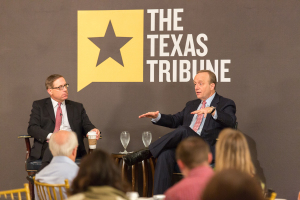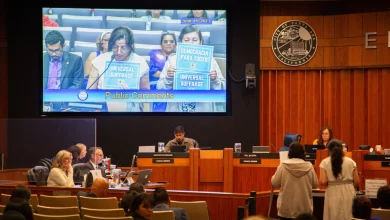
Originally published in the February 2106 issue of Liberation Newspaper
In schools, on TV and in newspapers, workers and oppressed people are constantly reminded how lucky they are to live in the “freest, most democratic nation on Earth.” This reaches a fever pitch around election time. Below, we list just eight of the ways that the electoral system is in fact a sham democracy—which gives the illusion of freedom and choice while protecting the rule of the same bankers and corporate power.
1) Millions are disenfranchised
The largest group denied voting rights in the United States are immigrants, over 40 million people who work and pay taxes but cannot participate in elections. Returning citizens who had been imprisoned for felonies are also stripped of voting rights – nearly 6 million as of the latest census data. In keeping with the racist nature of the prison system, this affects Black people most intensely. Nearly 8 percent of African Americans are prohibited from voting, reaching as high as 23 percent in Florida.
2) SuperPACs and big donors
Hundreds of millions of dollars flow into the campaigns of the Democratic and Republican politicians every cycle, primarily from the rich and corporations. This money buys the loyalty of, and access to, officials, which the rest of the population never sees. The infamous Citizens United Supreme Court decision effectively removed all limitations on campaign donations.
3) Corporate-controlled debates lock out third parties
The presidential debates are completely organized by private media corporations, who have struck deals with the two major parties to lock out third-party candidates and make sure that the populace does not hear anti-capitalist or radical ideas. Even candidates who have been on the ballot in nearly every state have been shut out. These same corporate media outlets set the rules and determine the questions for the candidates.
4) No days off for elections
In almost all countries, elections are held on the weekend or a national holiday is declared. But in the United States, voting takes place on Tuesdays, highly inconvenient for workers who are juggling job, family and school responsibilities. This is even worse when it comes to states that use the caucus process, which can drag on for hours, and makes it harder for workers with many responsibilities to participate. This year’s 16% turnout in the Iowa caucus was considered “high” and several precincts decided their victors by coin tosses!
5) Superdelegates
Sanders beat Hillary Clinton by over 20 points in New Hampshire, but Clinton may actually walk away with more New Hampshire delegates. How is this absurdity possible? Because the nominees of both parties are ultimately nominated by delegates to the national conventions, not by popular vote. The Democrats also have “superdelegates,” high-ranking party officials who can vote at the convention, but are not selected through primary voting. The Democratic establishment created this system after 1972 to prevent any insurgent candidate from winning the nominations. Now Clinton is using her near complete control of the Party machinery to count on the support of these unelected superdelegates and steal the nomination from Bernie Sanders if necessary.
6) Ballot access restrictions
Because elections are administered by the states, third-party candidates have to meet an extremely confusing patchwork of preconditions and obstacles to be listed on the ballot in each state. In many states, this means collecting prohibitively high numbers of signatures on petitions, as well as legal challenges to the validity of those signatures, regulations governing how the registered voters who sign the petitions are distributed amongst the counties of a state, filing fees and elector requirements. The Democratic and Republican candidates are almost always exempt from these rules, while a third party would need millions of dollars—and a lot of luck—just to get on the ballot!
7) The Electoral College
As was made clear in 2000, when Al Gore received more total votes but lost the election to George W. Bush, the popular vote does not determine who becomes president. The Electoral College does. In fact, people do not even technically vote for a candidate, they vote for electors who are pledged (but not required) to vote for a candidate when the Electoral College convenes. The Electoral College is unfairly weighted towards the smaller states as well. All this was included in the constitution by the “founding fathers” as a final line of defense to block a candidate who might be hostile to the interest of the elite.
8) Staggered primaries
It is a unique absurdity that the United States does not hold primary elections on a single day throughout the country. For states that vote late in the process, which includes some of the most populous such as California and Pennsylvania, it is likely that the nominee would have already been virtually decided. Iowa and New Hampshire, states with an overwhelmingly white population, vote first and therefore disproportionately determine the narrative and momentum of the campaign.
And we could go on!






